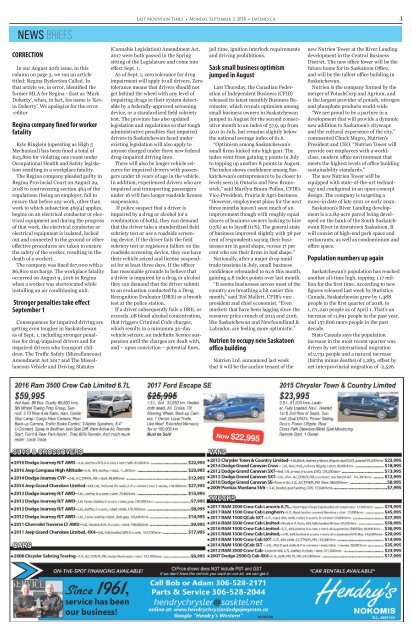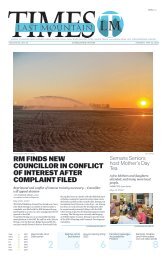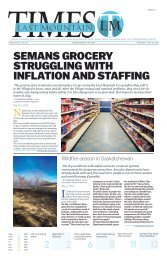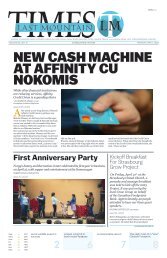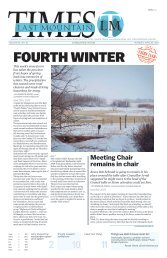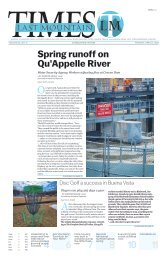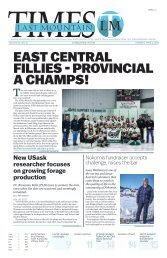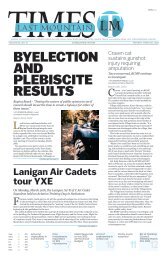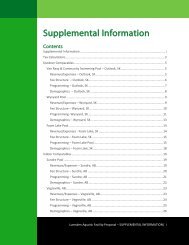LMT September 3 2018
You also want an ePaper? Increase the reach of your titles
YUMPU automatically turns print PDFs into web optimized ePapers that Google loves.
NEWS BRIEFS<br />
CORRECTION<br />
In our August 20th issue, in this<br />
column on page 3, we ran an article<br />
titled: Regina Byelection Called. In<br />
that article we, in error, identified the<br />
former MLA for Regina - East as ‘Mark<br />
Doherty’, when, in fact, his name is ‘Kevin<br />
Doherty’. We apologize for the error.<br />
-editor<br />
Regina company fined for worker<br />
fatality<br />
Kyle Ringlein (operating as High 5<br />
Mechanical) has been fined a total of<br />
$23,800 for violating one count under<br />
Occupational Health and Safety legislation<br />
resulting in a workplace fatality.<br />
The Regina company pleaded guilty in<br />
Regina Provincial Court on August 29,<br />
<strong>2018</strong> to contravening section 464 of the<br />
regulations (being an employer, fail to<br />
ensure that before any work, other than<br />
work to which subsection 465(4) applies,<br />
begins on an electrical conductor or electrical<br />
equipment and during the progress<br />
of that work, the electrical conductor or<br />
electrical equipment is isolated, locked<br />
out and connected to the ground or other<br />
effective procedures are taken to ensure<br />
the safety of the worker, resulting in the<br />
death of a worker).<br />
The company was fined $17,000 with a<br />
$6,800 surcharge. The workplace fatality<br />
occurred on August 9, 2016 in Regina<br />
when a worker was electrocuted while<br />
installing an air conditioning unit.<br />
Stronger penalties take effect<br />
<strong>September</strong> 1<br />
Consequences for impaired driving are<br />
getting even tougher in Saskatchewan<br />
as of Sept. 1, including stronger penalties<br />
for drug-impaired drivers and for<br />
impaired drivers who transport children.<br />
The Traffic Safety (Miscellaneous)<br />
Amendment Act 2017 and The Miscellaneous<br />
Vehicle and Driving Statutes<br />
Last Mountain Times • Monday, <strong>September</strong> 3, <strong>2018</strong> • lmtimes.ca<br />
(Cannabis Legislation) Amendment Act,<br />
2017 were both passed in the Spring<br />
sitting of the Legislature and come into<br />
effect Sept. 1.<br />
As of Sept. 1, zero tolerance for drug<br />
impairment will apply to all drivers. Zero<br />
tolerance means that drivers should not<br />
get behind the wheel with any level of<br />
impairing drugs in their system detectable<br />
by a federally-approved screening<br />
device, or a standardized field sobriety<br />
test. The province has also updated<br />
legislation and regulations so that tough<br />
administrative penalties that impaired<br />
drivers in Saskatchewan faced under<br />
existing legislation will also apply to<br />
anyone charged under three new federal<br />
drug-impaired driving laws.<br />
There will also be longer vehicle seizures<br />
for impaired drivers with passengers<br />
under 16 years of age in the vehicle.<br />
In addition, experienced drivers who are<br />
impaired and transporting passengers<br />
under 16 will face longer roadside license<br />
suspensions.<br />
If police suspect that a driver is<br />
impaired by a drug or alcohol (or a<br />
combination of both), they can demand<br />
that the driver take a standardized field<br />
sobriety test or use a roadside screening<br />
device. If the driver fails the field<br />
sobriety test or registers a failure on the<br />
roadside screening device, they can have<br />
their vehicle seized and license suspended<br />
for at least three days. If the officer<br />
has reasonable grounds to believe that<br />
a driver is impaired by a drug or alcohol<br />
they can demand that the driver submit<br />
to an evaluation conducted by a Drug<br />
Recognition Evaluator (DRE) or a breath<br />
test at the police station.<br />
If a driver subsequently fails a DRE, or<br />
exceeds .08 blood alcohol concentration,<br />
that triggers Criminal Code charges,<br />
which results in a minimum 30-day<br />
vehicle seizure, an indefinite licence suspension<br />
until the charges are dealt with,<br />
and – upon conviction – potential fines,<br />
jail time, ignition interlock requirements<br />
and driving prohibitions.<br />
Sask small business optimism<br />
jumped in August<br />
Last Thursday, the Canadian Federation<br />
of Independent Business (CFIB)<br />
released its latest monthly Business Barometer,<br />
which reveals optimism among<br />
small business owners in Saskatchewan<br />
jumped in August for the second consecutive<br />
month to an index of 57.9, up from<br />
50.0 in July, but remains slightly below<br />
the national average index of 61.6.<br />
“Optimism among Saskatchewan’s<br />
small firms kicked into high gear. The<br />
index went from gaining 5 points in July<br />
to topping up another 8 points in August.<br />
The index shows confidence among Saskatchewan’s<br />
entrepreneurs to be closer to<br />
levels seen in Ontario and New Brunswick,”<br />
said Marilyn Braun-Pollon, CFIB’s<br />
Vice-President, Prairie & Agri-business.<br />
“However, employment plans for the next<br />
three months haven’t seen much of an<br />
improvement though with roughly equal<br />
shares of business owners looking to hire<br />
(13%) as to layoff (11%). The general state<br />
of business improved slightly with 38 per<br />
cent of respondents saying their businesses<br />
are in good shape, versus 17 per<br />
cent who see their firms in bad shape.”<br />
Nationally, after a major drop amid<br />
trade tensions in July, small business<br />
confidence rebounded to 61.6 this month,<br />
gaining 4.8 index points over last month.<br />
“It seems businesses across most of the<br />
country are breathing a bit easier this<br />
month,” said Ted Mallett, CFIB’s vice<br />
president and chief economist. “Even<br />
markets that have been lagging since the<br />
resource price crunch of 2015 and 2016,<br />
like Saskatchewan and Newfoundland &<br />
Labrador, are feeling more optimistic.”<br />
Nutrien to occupy new Saskatoon<br />
office building<br />
Nutrien Ltd. announced last week<br />
that it will be the anchor tenant of the<br />
new Nutrien Tower at the River Landing<br />
development in the Central Business<br />
District. The new office tower will be the<br />
future home for its Saskatoon Office,<br />
and will be the tallest office building in<br />
Saskatchewan.<br />
Nutrien is the company formed by the<br />
merger of PotashCorp and Agrium, and<br />
is the largest provider of potash, nitrogen<br />
and phosphate products world-wide<br />
“We are proud to be a partner in a<br />
development that will provide a dynamic<br />
new addition to Saskatoon’s cityscape<br />
and the cultural experience of the city,”<br />
commented Chuck Magro, Nutrien’s<br />
President and CEO. “Nutrien Tower will<br />
provide our employees with a worldclass,<br />
modern office environment that<br />
meets the highest levels of office building<br />
sustainability standards.”<br />
The new Nutrien Tower will be<br />
equipped with state-of-the-art technology<br />
and configured in an open-concept<br />
design. The company is targeting a<br />
move-in date of late 2021 or early 2022.<br />
Saskatoon’s River Landing development<br />
is a 2.84-acre parcel being developed<br />
on the bank of the South Saskatchewan<br />
River in downtown Saskatoon. It<br />
will consist of high-end park space and<br />
restaurants, as well as condominium and<br />
office space.<br />
Population numbers up again<br />
Saskatchewan’s population has reached<br />
another all-time high, topping 1.17 million<br />
for the first time. According to new<br />
figures released last week by Statistics<br />
Canada, Saskatchewan grew by 1,488<br />
people in the first quarter of <strong>2018</strong>, to<br />
1,171,240 people as of April 1. That’s an<br />
increase of 11,691 people in the past year,<br />
and 157,806 more people in the past<br />
decade.<br />
Stats Canada says the population<br />
increase in the most recent quarter was<br />
driven by net international migration<br />
of 2,731 people and a natural increase<br />
(births minus deaths) of 1,283, offset by<br />
net interprovincial migration of -2,526.<br />
3


